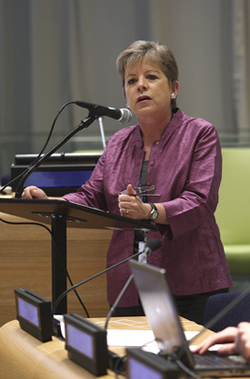ECLAC Executive Secretary Took Part in Debate on Inequality
Topic(s)
The activity was opened by UN Secretary-General, Ban Ki-moon, in New York.

(8 July 2013) Speaking today in New York, United States, the Executive Secretary of the Economic Commission for Latin America and the Caribbean (ECLAC), Alicia Bárcena, stated "In Latin America and the Caribbean, we have a historic opportunity to rethink development using equality and environmental sustainability as our compass".
Ms. Bárcena and government officials and representatives from international agencies took part in the high-level session to open the debate on inequality organized by the United Nations General Assembly.
The debate was inaugurated by UN Secretary-General, Ban Ki-moon, President of the General Assembly, Vuk Jeremic, and the Secretary-General of the Organization of American States (OAS), José Miguel Insulza.
Ban Ki-moon stated that the fight against inequality is a key issue in discussions on the post-2015 development agenda. According to the Organization's most senior official, in many countries the gap between rich and poor is widening, and there remain major disparities in terms of access to health and education among families depending on their income.
Ms. Bárcena's speech covered the main economic and social achievements of Latin American and Caribbean countries in the past decade, as well as some challenges pending.
She explained that, between 2002 and 2012, Latin American and Caribbean countries grew at an annual rate of almost 4%. Growth is steady, but with some fluctuations such as the 1.9% fall in 2009, mainly on the back of buoyant internal demand (particularly in terms of private consumption).
Over the same period, the unemployment rate dipped dramatically from 15.8% in 2002 to 6.4% in 2012, while real wages also increased.
According to Ms. Bárcena "The world economic crisis has had a negative but not a dramatic impact on Latin America and the Caribbean. The main effect has been felt in terms of trade". She stated that the region's resilience to this situation is due to countries' macroeconomic prudence during the boom period, as well as the countercyclical policies implemented during the crisis.
The senior official of ECLAC pointed out that poverty and inequality have also fallen in Latin American and Caribbean countries. Whereas the 1990s were typified by rising inequality, there was a turnaround in the region from 2003, relating to labour market developments (including rising employment and falling wage inequality). "However, much remains to be done", emphasized Ms. Bárcena.
She mentioned that economic advances have not resulted in changes to the region's production structure.
Two thirds of the GDP of the region's countries (66.9%) is generated by the high-productivity sector, 22.5% by the intermediate sector and 10.6% by the low-productivity sector. This distribution is reversed for employment: the high-productivity sector (mainly related to natural resource exploitation and commodity production) generates just 19.8% of jobs, while the medium-productivity sector employs 30% of workers and the low-productivity sector accounts for 50.2% of the workforce.
For the ECLAC Executive Secretary, "structural change is at the heart of a long-term growth process with employment and equality", and this should be aimed at closing productive and social gaps. She stated that the main ongoing social challenge was to make progress towards universalizing social protection.
She concluded "In order to picture our region's future, it is vital to recognize that equality is the main ethical principle and the ultimate objective".
Any queries should be sent to the ECLAC Public Information and Web Services Section.
E-mail: prensa@cepal.org; Telephone: (56 2) 210 2040.
Follow us on: Twitter, Facebook, Flickr and YouTube
Country(ies)
- Latin America and the Caribbean